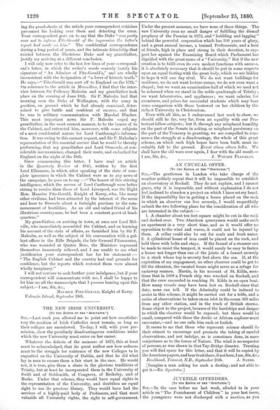AN UNUSUAL OFFER.
[To THE EDITOR OP THE " SPECTATOR."] SIR,—The gentlemen in London who take charge of the weather politely repeat that it will be impossible to establish
an observatory at Rockall. They do not explain, and I cannot guess, why it is impossible, and without explanation I do not feel inclined to abandon a project on which I have set my heart. If the impossibility lies in getting a house placed on the rock in which an observer can live securely, I would respectfully submit the two following plans for the consideration of all who. are interested in the subject :- 1. A chamber about ten feet square might be cut in the rock and decked over. Two Aberdeen quarrymen would make such an apartment in a very short time, and as it would offer na opposition to the wind and waves, it could not be injured by them. A cellar could also be cut for coals and fresh water. 2. A cylindrical house of iron could be placed on the rock, and held there with bolts and stays. If the funnel of a steamer can be made to resist the tempest, it would surely be easy to fasten a house not longer than one of the joints of a funnel securely to a stock whose top is seventy feet above the sea. If, at the expiration of my engagement, no other observer could be got to fill the situation, the vacated house might serve as a refuge for castaway seamen. Martin, in his account of St. Kilda, men- tions that in 1698 a French ship was wrecked on Rockall, and that the crew succeeded in reaching St. Kilda in an open boat. How many vessels may have been lost on Rockall since that date, none can tell. If the Admiralty could be induced to assist in this scheme, it might be carried out for a trifle, and a series of observations be taken on an islet in the ocean 300 miles from any other station, and in the track of British storms. Some object to the project, because of the hardships and danger to which the observer would be exposed; but these would be small, compared with those the Arctic or African explorer must encounter,—and no one calls him rash or foolish.
It seems to me that those who represent science should do their utmost to encourage and promote the taking of careful observations, and not indulge, as is sometimes done, in mere conjectures as to the forces of Nature. The wind is no respecter of persons, as was shown in that Tay-Bridge disaster. Trusting you will find space for this letter, and that it will be copied by the American papers, and bear fruit there, if not here, I am, Sir, Ste.s Bankhead, Tranent, N.B., September 20th. J. SANDS.
[Imagine a man asking for such a destiny, and not able to get it.—En. Spectator.]


































 Previous page
Previous page